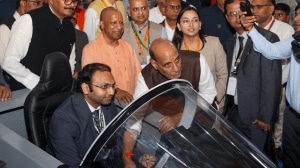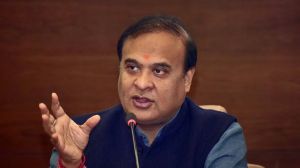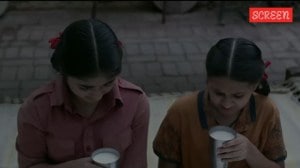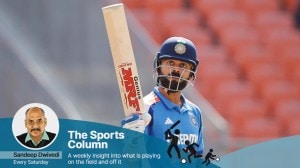The age of pulp patriotism
Politics sometimes becomes a masquerade of stereotypes where images and characters, coloured and blown up over time, pass off as real and no...

Politics sometimes becomes a masquerade of stereotypes where images and characters, coloured and blown up over time, pass off as real and normal ones. Survival is easier for politicians in an unreal world which exists only in the realm of popular imagination. That explains why the Bharatiya Janata Party (BJP)’s idea of patriotism is similar to that of Bollywood, if not borrowed from it.
In Bollywood and the BJP, patriotism does not exist without a villain. You need to have an enemy to prove that you love the country. If there’s none, invent one. Movies create villains to suit the script, the budget and the cast. They have as villain, for instance, a dark-skinned Kashmiri militant who speaks a south Indian language. Or a scientist who has gone mad and is funded by foreign powers to destroy India for no apparent reason. Bizarre, but it works.
The BJP too creates villains according to its own fantasies and insecurities. He is a big bad guy, a role Amrish Puri is condemned to play in films. He steals nucleartechnology from other countries, makes bombs to arm missiles targeted at India’s cities. He has allies inside India, almost everywhere, and he keeps creating trouble. His money comes from devious and nefarious allies. Mugambo or Robert or Khan, there is nothing humane about him or the people around him. He is hell.
The BJP’s script has Pakistan with all these features and more as the villain and China as his godfather. Both are aggressors and both live to harass India. The only possible way of communication with the enemy is war, what else? The hero is ready for it.
Played by Amitabh Bachchan or Akshay Kumar, he never shows any sign of vulnerability. He is honest, brave, intelligent, strong, kind and what not. The villain and the hero exchange kicks, punches or bullets, fight over the rooftop, dangle from the top floor of a skyscraper and effortlessly jump down. The villain becomes a heap of flesh. The hero gets up with a smile, he never gets hurt. You call him Vijay.
If he is all virtues rolled intoone, the villain has to be the other extreme. There is no room for ambiguity there are no bright spots in the villain, no dark spots in the hero. So no question of the hero admitting to his mistakes: he is just not capable of committing any. His business is to finish off the villain.
But films don’t begin with battles. They are meant for the end. So what do you do to keep the audience watching till the last shot? Dialogue. They used to call it `speech’ in Tamil where Shivaji Ganeshan spoke for six or seven minutes, not even once pausing for breath. In Bollywood, it’s shorter but the tone is no less emotional.
So Madan Lal Khurana asks the villain to tell the place and time so that they can meet and sort it out, settle it once and for all. So L.K. Advani goes to the border to threaten the enemy, comes back and repeats the speech. The hero keeps saying that no force in the world is capable of beating him. As the script meanders and thins out, there is more pulp and patriotism to stuff it fat.
Somewherealong the line, the barrier between Bollywood and politics melts. And seasoned players from the movies come out to enact the politics of pulp patriotism. The logic is that if they can keep the audience glued to the screen, they can do the same in politics. So there was a string of second-rung actors from Ramanand Sagar’s Ramayana and B.R. Chopra’s Mahabharata parading as politicians. Some faded away but more followed.
The BJP wooed and welcomed several filmstars across the country just before the elections of 1998. And perhaps the most exciting day in the life of the BJP in the run-up to the parliamentary elections was when former Bollywood hero Vinod Khanna announced his decision to join it. For the record, his only contribution to Indian society in the political avatar was a statement which said AIDS patients should wear badges so that they can be identified. Stupid? Absurd? Loony? It does not really matter.
What matters is rhetoric. The players have to resort to rhetoric, add spice to speeches andfind new monsters to target when the audience gets tired of the old ones. When that too seems not enough, the last resort is special effects.
Blockbusters are all about packaging. Pulp patriotism does not always sell on speeches, it needs to be accompanied by guns and bombs. So the allocation on defence goes up and the hero signals he is always ready for the war. The audience should clap when the hero exhibits his machismo and armour.
Tear-jerkers are out of fashion and it does not go along the macho version of politics. Tears, if at all, should be of joy and reserved for historic moments. The Union Home Minister, a magazine tells us, cried when Pokharan II happened. Six years ago too, on a December morning, he had cried though then India was told those were the tears of regret and sadness.
Outside the movies, unfortunately, there are no such happy endings. The world of mutual admiration of the BJP and the Bollywood, and the osmosis and symbiosis of their ideas stop at the gate of international politics– and long-term domestic politics. A Bollywood film lasts three hours, the future, unfortunately, lasts a long time.





- 01
- 02
- 03
- 04
- 05


























